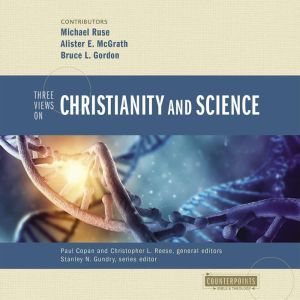About Paul Copan
Paul Copan (PhD, Marquette University) is the Pledger Family Chair of Philosophy and Ethics at Palm Beach Atlantic University in West Palm Beach, Florida. In addition to authoring many journal articles, he has written or edited over thirty books in philosophy, theology, and apologetics, including Creation Out of Nothing: A Biblical, Philosophical, and Scientific Exploration, and has served as President of the Evangelical Philosophical Society. He and his wife, Jacqueline, have six children and live in West Palm Beach.
About Christopher L. Reese
Christopher Reese is a freelance writer and the managing editor of The Worldview Bulletin. He cofounded the Christian Apologetics Alliance and is a general editor of The Dictionary of Christianity and Science (Zondervan, 2017).
About Michael Ruse
Michael Ruse was formerly the Lucyle T. Werkmeister Professor of Philosophy and the Director of the History and Philosophy of Science Program at Florida State University. He is a philosopher and historian of science, mainly evolutionary theory, and has been much involved in fighting Creationism. The author or editor of over fifty books, he is the founding editor of the journal Biology and Philosophy. A sometime Guggenheim Fellow and Gifford Lecturer, a Fellow of the Royal Society of Canada, he is the recipient of four honorary degrees and other honors.
About Alister E. McGrath
Alister E. McGrath is a historian, biochemist, and Christian theologian born in Belfast, Northern Ireland. McGrath, a longtime professor at Oxford University, now holds the Chair in Science and Religion at Oxford. He is the author of several books on theology and apologetics, including Christianity's Dangerous Idea and Mere Apologetics. He lives in Oxford, England and lectures regularly in the United States.
About Bruce L. Gordon
Bruce L. Gordon (PhD, Northwestern University) is Associate Professor of the History and Philosophy of Science at Houston Baptist University. He is a co-editor and contributor to The Nature of Nature: Examining the Role of Naturalism in Science (ISI Books, 2011) and Biological Information: New Perspectives (World Scientific, 2013), as well as the author of many articles for academic journals and edited collections including, most recently, "Idealism and Science: The Quantum-Theoretic and Neuroscientific Foundations of Reality" in Rethinking Idealism and Immaterialism (Routledge, forthcoming 2020), "Scientific Explanations are Not Limited to Natural Causes" in Problems in Epistemology and Metaphysics (Bloomsbury Academic, 2020), "The Necessity of Sufficiency: The Argument from the Incompleteness of Nature" in Two Dozen (or so) Arguments for God: The Plantinga Project (Oxford University Press, 2018), and "The Incompatibility of Physicalism with Physics" in Christian Physicalism? Philosophical Theological Criticisms (Lexington Books, 2018).




